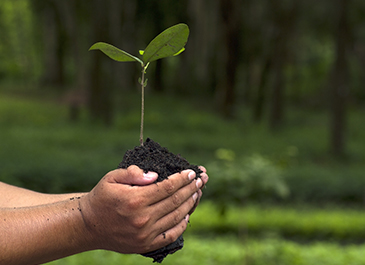April 22 is Earth Day—celebrate like it’s New Year’s! Much like New Year’s, Earth Day signals a time to reflect on how your personal choices affect the planet and provides that extra push it takes to make resolutions that lighten your ecological footprint.
You may have already developed habits to help the planet— recycling and reusing, walking or biking instead of driving, switching off the lights—but what about the foods you eat? Surprisingly, your food habits impact the planet more than you realize. In honour of Earth Day, here are a few steps you can take for the planet.
Go Organic
When the environment comes to mind, the term organic is sure to follow. Foods that are grown and/or raised using organic farming practices are a benefit to Mother Earth. Over time, conventional agriculture strips the land of its nutrients and pollutes the air, water and soil through the use of plant growth regulators, livestock feed additives and synthetic pesticides and fertilizers. Organic farming methods focus on crop rotation, composting and biological pesticides, which all play a part in preserving soil and result in healthier, nutrientrich foods.
Tread Lightly
Choosing local foods is another key component in caring for the earth. By consciously deciding to eat locally you’re supporting not only your local economy but also the wellbeing of the environment. Local food travels less, resulting in fewer carbon emissions. As an added bonus, local food can be picked closer to its peak, meaning a whack of nutrients and flavour for you.
How can you go local? Look for the BC Grown label on your favourite foods. Contact organizations such as Get Local (www.getlocalbc.org) that promote eating close to home. To help further reduce your “Food Miles,” rely on your patio or backyard. Get your hands dirty and plant a window box full of herbs or tomatoes. They’re easy to love and will help you reconnect with food. You can also help protect dwindling honey bee populations by planting raspberry bushes or herbs like lavender and rosemary.
Eat Your Greens
Try eating meatless meals a few times a week. Some sources believe that eating vegetarian is the carbon equivalent of driving a hybrid. Veggie meals such as three-bean chili, veggie or tofu stir-fry and meatless spaghetti bolognaise are kind to the planet and won’t hurt your waste line or your wallet—talk about a triple threat.
Reduce AND Reuse
Now that you have all of that lovely local food, what do you do with it? For your health and your pocketbook, steer clear of take out and pack your own lunch. There are plenty of options to help you go litter-free. Choose reusable lunch containers and reusable (but losable) recycled cutlery. A cloth napkin and non-plastic water bottle will round out the meal. When grocery shopping, avoid single-serve packs; it takes mere minutes to scoop yogurt into a lunch cup, which dramatically reduces your plastic consumption.

